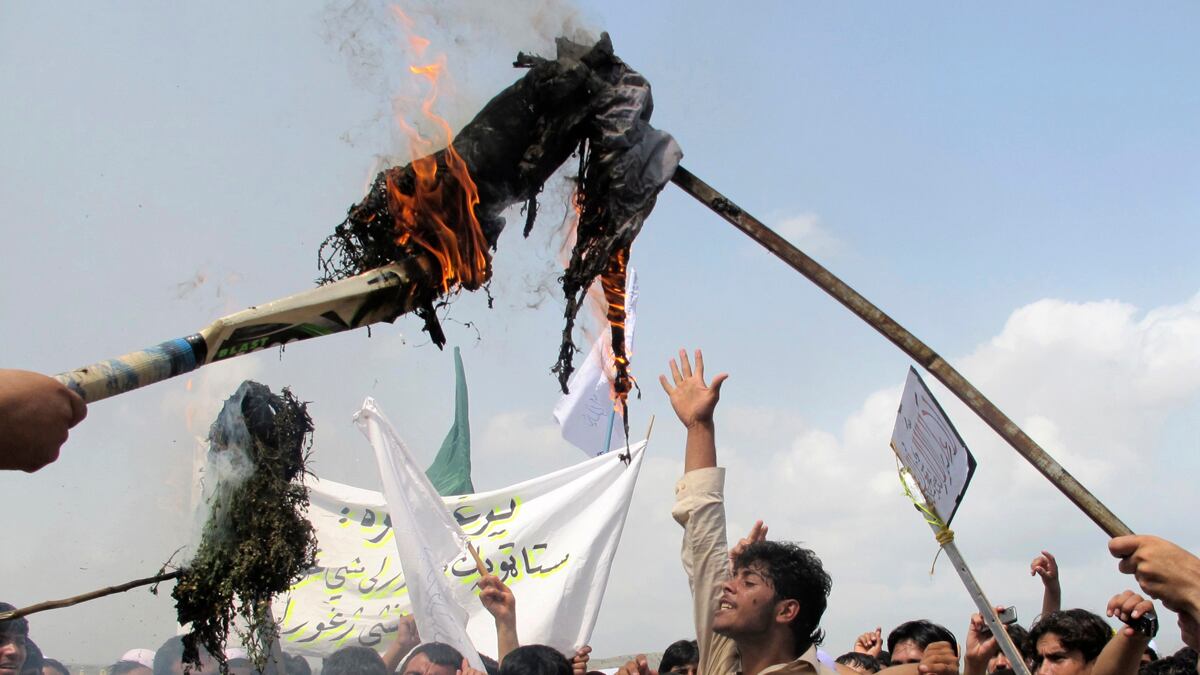I was all set to take a swipe at the Obama team for not being strong enough in their response to last week’s horrors in Libya and Egypt. But the more I dug into what they said and did, the more I saw that they handled matters about as well as possible under nasty circumstances and demanding time pressures. They told irate Muslims that although the video that sparked the riots was obnoxious, no one was going to tell Americans what they can or cannot say. And they reminded Arab governments that their prime duty was to protect U.S. diplomats and other personnel. I would have added that otherwise, we’d take our people and our aid home, and maybe that still needs to be said. All told, the Obama administration deserves none of the slurs hurled its way by Romneyites.
As I plunged further into the turmoil, what struck me was not the Romney camp’s silly charges, but several rather important mysteries about who knew what and who did what. Digging for the facts here almost certainly will help prevent and cope with future Muslim mayhem.
First is a report of claims by a Libyan deputy interior minister that he had warned U.S. officials of imminent trouble in Benghazi. Whom exactly did he warn, and when? And what, if anything, did the supposedly informed U.S. officials do about it? Also, much more to the point, what, if anything, did the Libyan government do about it? If they knew something, Libyan officials in Benghazi and Tripoli could have beefed up their own security substantially around the endangered U.S. consulate.
The second mystery concerns the attack on the consulate. Was it a pre-planned al Qaeda operation waiting for an opportunity, or was it essentially a spontaneous armed mob infuriated by the video? The current administration theory is mainly the former; i.e., that it started spontaneously but that terrorists cleverly piggybacked on it. The attack, they say, was not carried out haphazardly and involved a lot of specialized weapons like mortars and rockets, weapons not associated with mobs. If the evidence holds up, Washington has to work urgently with host governments to plan for such assaults. The answer can’t be putting more Marines in diplomatic outposts. Their job is not to defend embassies against major attacks. There never can be enough of them enough to fend off distant high-powered guns and hundreds of attackers. A typical Marine force in these circumstances is rarely more than 15-20 at embassies and a lesser number at consulates. Protection is the responsibility of the host country, and while some Libyan guards fought, most ran away and, in any event, there were not nearly enough of them.
A third and worrisome mystery is whether some of the Libyan guards were complicit in gathering intelligence about the consulate for the attackers. Sean Smith, the information management officer killed in the attack, had posted online the evening of the assault, “We saw one of our ‘police’ that guard the compound taking pictures.” The FBI is investigating whether there was a mole or moles among the guards.

The fourth mystery, moving onto the Cairo mob’s attack on the U.S. Embassy there, concerns the circumstances surrounding the now famous statement issued by an embassy officer before the mob breached embassy grounds. Recall, this statement condemned the infamous video in an effort to release mounting steam against the embassy. According to a report on Foreign Policy’s website, the Cairo staff had sent the text—considered a routine precautionary measure—to Washington. An unidentified State Department official said the department sent the statement back, saying it needed revisions, but the embassy official replied that it had already been issued. This story needs checking, not because of hard evidence that some official bungled things but to examine emergency procedures. In crises, embassies need freedom to act quickly, but there still can be emergency procedures to help.
The fifth mystery, given what Egyptian security guards did and did not do to stave off the mob, concerns Egyptian policy for protecting U.S. embassies and consulates. Egyptian officials argue that their guards were correct in not using force to repel the protesters and thus allowing them to overrun U.S. territory. The Cairo government maintains that it makes sense not to fire on unarmed protesters. But that abdicates Egypt’s total responsibility to protect embassies. And sticking to that policy only invites further attacks because rioters need not fear serious consequences, especially getting shot. With Egypt’s policy, it’s just dumb luck the mob didn’t kill U.S. personnel last week as they did in Libya. Surely there must be some mysterious misunderstanding here.
These are the real issues, and not the ones Mitt Romney and his cohorts have been trying to sell. By any standard of reason, President Obama and Secretary of State Clinton conducted themselves very well amid the confusion and crises. Of course they didn’t do everything perfectly; for example, some unidentified administration official disowned the embassy statement condemning the video. Such creepiness served only to make it look like Obama was running for cover at the expense of our embattled diplomats. But minor miscues aside, Obama and Clinton nailed the main points, especially Clinton. In her first statement soon after the riots, here’s what she said: “The United States deplores any intentional effort to denigrate the religious beliefs of others. Our commitment to religious tolerance goes back to the very beginning of our nation. But let me be clear: There is never any justification for violent acts of this kind.”
The mysteries raised in this reflection lack the sexiness to seduce news anchors or political campaigners. But they are the practical stuff of which the future safety of American diplomats abroad will hinge. Obama, in particular, will have to twist arms to solve the mysteries raised by these awful riots. And he’ll have to go further and crack Libyan and Egyptian heads to get those governments to do what they must to protect American diplomats. If he doesn’t do so, and soon, Romney and his cohorts will have plenty to complain about, legitimately.






